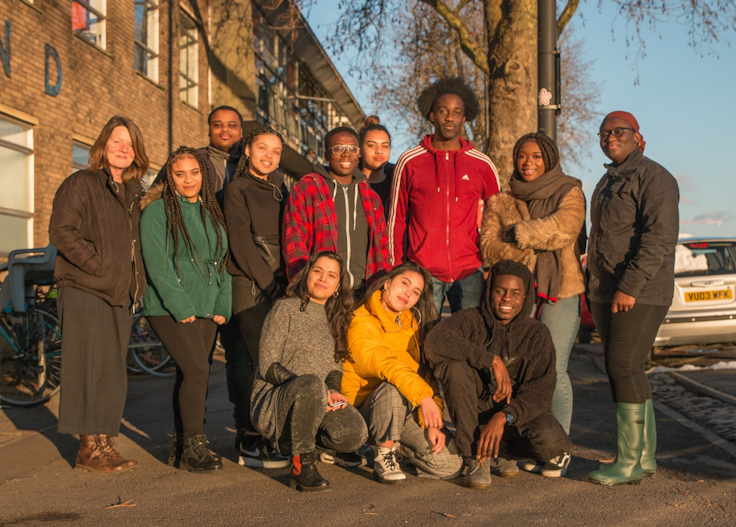What does radical change look like?
Rising Founder/Director Kamina shares her vision for social change and the future of arts leadership.
People often ask me what radical social change looks like from my perspective. In this short piece I’ll aim to offer a response by outlining some of the challenges we currently face in society and how the work I’m involved in might help tackle and maybe even resolve some of these issues.
Increasingly in our culture young people are undervalued, undermined, lacking security and work opportunities, and burdened with social anxiety and university debt. Yet these young people are our future and my inspiration, and provide me with the greatest sense of hope. It is this tension that fuels my work, motivates and challenges me, and forms the bedrock of the Bristol-based social enterprise that is Rising Arts Agency.
So, what or who is Rising? We’re a collective, a community, a family made up almost exclusively of young people under the age of 30. Culture, creativity and the arts underpin all our activity, but the real work involves challenging the status quo, championing social change, and not just talking about inclusion but living it in everything we do.
The creative sector is in a bit of a rut. Funding is diminishing while funders’ demands become ever more specific. Funding application processes remain confusing and inaccessible to many. Creativity is being pushed further and further from the education agenda. A career in the arts remains a non-viable option in the minds of many parents and carers, particularly from BAME and low income communities. The sector’s leadership is predominantly like me: white, middle class and over the age of 40. It doesn’t look like people are about to step aside for new voices, new faces and new leaders. Yet the talk is all about diversifying the workforce.
Work is still often funding-led rather than led by the people that it exists to engage. ‘Partnership’ is the buzz word, but many of these are unequal, unproductive and exist in name more than in reality. Job opportunities in the sector open to young people are often on zero hours contracts and poorly paid, or require a degree and/or a least two years’ experience in the field. People are expected to work long and flexible hours and a healthy work/life balance is often impossible to achieve. Organisations are governed by people who are often totally disconnected from the communities they are trying to reach or engage.
There are lots of organisations in the region, both large and small, who are trying really hard to create change, but too often the talk outweighs the action. I, along with my team at Rising, believe that we all have a responsibility to make change happen. That’s why our mission is ‘Led by young creative thinkers, we empower people to collectively aspire, provoke and mobilise towards radical cultural change.’ We’re a grass roots agency that has grown out of my creative practice where the emphasis is on conversation, collaboration and community. The agency was born out of young people’s frustration around the lack of access and opportunity they perceived across the sector. From the outset it has been co-created.
Working in the planning stage in 2015 was a student on work placement with me, Laura Gabe – she became our first non-executive Director when we registered as a CIC in June 2016. More recently, one of our young Advisory Board members, Emma Morsi, made the transition to join Laura as our second non-exec Director. Around the same time we decided that our Youth Board, who were making all our strategic decisions, should take on the governance of the agency and replace our existing Advisory Board. We are now exclusively governed by young people, all of who are under the age of 26.
We believe that young people are leaders now. They should be represented at every level of the arts, including the strategic. We are working towards embedding a diverse range of young people in strategic decision-making positions with the intention of shaping a truly inclusive cultural scene. Our programme OnBoard focuses on getting young people into governance with the intention of making a real difference to the future strategy of cultural sector organisations across the region. In just over one year we have supported 15 young people into Board/Trustee roles across a broad range of the Arts Council’s National Portfolio organisations (NPOs) and other cultural programmes.

A Whose Culture group outside Spike Island. Photo by Shamil Ahmed.
With our Arts Council funded leadership pilot, BE IT, we are modelling a unique programme of leadership development that suits young people’s learning styles, their communication needs and their fragmented schedule. The pilot creates opportunity and space for the cohort to learn, experiment, fail and grow. We are working in partnership with the Mayor’s Office, the Head of Culture and Bristol City Council’s Culture Team to ensure this effective, strategic change we aspire to through a sustainable and transferable model for supporting young cultural leaders.
While always placing our focus on supporting young people who have previously felt excluded from the sector, over the past two years we have seen a significant shift in our community with over 60% of those we support being young people of colour. This has come about as a result of consciously profiling diverse young artists on our website and through our public programme, ensuring that a truly diverse community of young people see themselves reflected back. We work hard to build inclusive spaces where everyone feels safe, visible and heard. Through our two year co-produced action research pilot, Whose Culture, we focused on mapping and understanding the cultural engagement and experiences of people of colour aged 16-25. All this work involves risk taking, exploring new territory, having the courage to fail, learn, adapt and move on.
So, what’s my personal vision for leadership and the future? Reni Eddo-Lodge states in her book ‘Why I’m No Longer Talking to White People About Race’:
“I want to deconstruct the structural power of a system that marked me out as different.”
This is how I see Rising’s mission. My own leadership approach has been about authentic participation, where the people I engage with have ownership and authorship over the work. Co-creation and voice are crucial in this. Within Rising I try to model and encourage horizontal leadership, giving young people the opportunity, strength and belief to represent themselves. Self-care is a vital part of my own leadership journey and one I encourage others to practice. The most exciting energy, innovation and talent more often than not sits with young people. Yet the dominant perception is still that leaders need age and experience.
In recognising my own privilege I have done my best to use this to create opportunity for others and start to re-distribute cultural capital. In 2014 I embarked on my own leadership journey and committed to support young people through an agency model based on trust, motivation, shared responsibility and co-creation. This is Rising. Right from the start my vision was to lead the agency for 5 years and then pass on the leadership to members of the team who would lead for the next 5 years before passing the baton on themselves. Work has now begun for this transition with team members Jess Bunyan, Development Manager, and Euella Jackson, Engagement Producer, preparing to step up as Co-Directors in September 2021.
The future is uncertain but we must believe in our young people and give them the opportunities to believe in themselves. We all have a responsibility to listen to them, provide them with resources, opportunity, security and the space to both succeed and fail. Rising’s work is an invitation to the cultural sector and the wider community to step up and demonstrate their belief too.

